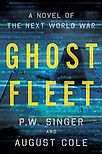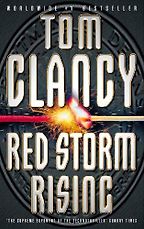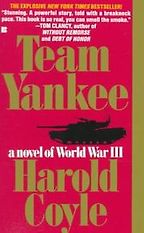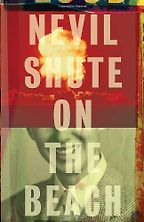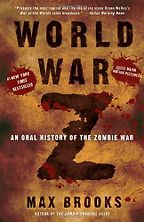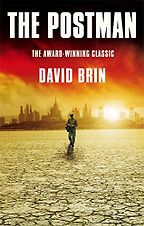Why war and science fiction?
Singer: I’ve always been fascinated by the combination of history and science fiction. When I was a little kid I had my models of WWII planes strafe Legoland and Star Wars figures, and would read Tom Clancy novels and history books when I was supposed to be outside playing. What drew us to this book was to connect that fascination with science fiction and history to explore something that was once believable – the idea of great powers going to war, which shaped the 20th century in everything from its politics to how we look at sporting competitions.
This fear became unthinkable over the past 15+ years. Yet now that risk is back. Once more we are looking at arms races, such as that taking place in the Pacific, the series of military face-offs in the South China Sea and Europe, with Russia and NATO at their highest points of alert since the 1980s. So it seemed an apt topic to explore from the real world side, but to look at it in an exciting new way through the lens of fiction.
Cole: With Ghost Fleet, we wanted to place people in a world that was very hard to talk about in Washington. Fiction allows you to bridge the world that you are familiar with one where the characters and facts combine to really challenge your assumptions about what you believe. A novel becomes a sort of tool, but in an engaging way where you’re moving beyond the purely analytical and making room for the narrative. It activates your imagination in the same way really well-done history does.
How did the co-writing process work?
Singer: You never get writer’s block when you’re working as a team. It was a little like 3D printing – a constant back and forth: coming up with an idea, then the other taking that idea to design layers on top of it or rework it internally. Then the other does the same. Back and forth.
“We wanted to place people in a world that was very hard to talk about in Washington.”
Cole: The ability to look at your work with fresh eyes is a huge challenge, particularly in fiction. Having someone over your shoulder is immensely helpful.
Did you start with the tech or the story?
Singer: You have to start with the story, something that’s narratively compelling and colourful. Only then can you pepper it with things or tech that we came across. In the DC policy world, we have people saying to us like ‘Oh we should do a Ghost Fleet for health care policy.’ My reaction is “Sounds great, but what’s your story? Who are the characters?” Technology is just a tool and so you have to treat it that way in both the real world and fiction. When a character is in a situation, they reach for something to solve that problem, whether it’s a hammer or an electromagnetic rail gun.
It was important for us to put the nonfiction style endnotes in to remind readers that no matter how crazy some of our technology sounds, it’s real. David Foster Wallace would use footnotes to continue fiction, or Tolkien for extra lore, but we follow the rules of non-fiction references so the reader can go find the sources in the real world.
So why has your book gotten military minds thinking more than your average think tank policy paper?
Cole: You can create something that allows your imagination to help make abstract concepts real. That’s not to say there’s not a place for white papers; I have written plenty of them. But when you’re trying to reach as many people as possible on the challenges of the security environment today, fiction connects directly with people, particularly when thinking about the future.
“We put nonfiction style endnotes in to remind readers that no matter how crazy some of our technology sounds, it’s real.”
Singer: One of the things you can do in fiction that’s helpful is engage different ways of thinking. It’s not just giving someone information the way a memo might. You can engage their curiosity. “What if? What would I do? How could this play out?” You can also engage emotion and empathy, in what characters are feeling and reacting. You care about characters in fiction. We’ve seen this happen in Ghost Fleet – we know of four-star generals and admirals who are excited to talk about it with other admirals or their staff. There’s that excitement there that isn’t something you get with a memo. One of the kind things an Admiral said to us is that he read the book after he was told by another Admiral to read it in the Pentagon Situation Room because “It kept me up late last night.’ Memos don’t do that – novels do.
If you two ran the [US] Defense Department, would you require flag officers to write short stories and use their imagination as part of the promotion process?
Cole: It’s a great idea. It forces you, whether you’re comfortable or not to use a different part of your brain. There is a movement among junior officers to really share and think ideas. It’s starting in fiction as well. We’re seeing some official reception of it in some of the work I’ve done through the Atlantic Council’s Art of the Future Project supporting the Futures Directorate at the Marine Corps Warfighting Laboratory. We worked with some really talented Marines and other service members along with novelists Charles E. Gannon and Max Brooks, who is also an Atlantic Council fellow, to develop vignettes that bring the world of 2030 to 2045 to life. Ghost Fleet helps with this too because it introduces another way to think about some vexing defence and security issues from the future that you have to confront today; I think this is one of the reasons why Commandant of the Marine Corps, General Robert Neller, is a good advocate of our book.
“Too often in defence planning, we look only at the positives.”
Singer: I’d definitely require it at younger levels. It’s a tool, a method for visualising. People should connect their programs to realistic scenarios, which has been a problem for US planning in recent wars. We spend hundreds of millions of dollars on programs but everyone knows if you put them in a certain scenario it’s not going to work out the way we planned. What scenarios and good fiction do, like wargaming, is to force you to explore how something would work in a challenging setting, or not work. Too often in defence planning, we look only at the positives. In both fictional and real war, the best and most likely outcome isn’t: ‘War begins, everything goes according to plan, the end.’ It’s not realistic and it wouldn’t be a good book. But too often that’s how people plan in the real world.
So, your first choice not only gripped four-star generals but President Reagan: thoughts on Red Storm Rising and Tom Clancy?
Cole: It was a game-changing book. It came out when I was about 12. I liked how it told the story from so many points of view, it felt like you were experiencing it firsthand. It had great technical information. It wasn’t literature but it was a hell of a good story – it inspired me and showed how you could make explaining real-world military technology a central part of the tale. It was definitely fiction that people in the government could read on Sunday and take to work on Monday.
Singer: Tom Clancy was the master and Red Storm Rising was written at the height of his game. The reading experience was addictive – we both remember reading it on our summer vacations. I was reading it on the way to the beach in the back of a station wagon and later on, on a sunny day, I stayed inside to finish the book. You talk to generals now who were junior officers then who had that same experience. We wanted to recreate that for people – that addictive summer beach read.
“It was fiction that people in the government could read on Sunday and take to work on Monday.”
It’s the definition of a techno-thriller. You feel like you’re learning about things that felt super exciting. He was talking about the stealth fighter two years before the US admitted it had them. We tried to do the same – pulling from DARPA reports, contract announcements–to give insight into what’s coming next.
Yet, in Clancy’s book, all the technology, all the weapons work as planned. That was its biggest failing in terms of realism. We wanted to play with that and have fragile technology for Ghost Fleet.
Onto Harold Coyle and Team Yankee, a book that focuses on the fictional Captain Bannon, who leads a company of around 150 men.
Singer: Sir John Hackett was a general at the time. His 1982 novel [The Third World War: The Untold Story], looked at what would happen if the NATO and Soviet war plans interacted. It was incredibly influential in the military at the time. In Team Yankee, Coyle takes one of the battles within this overall fictionalized war [and uses it as a starting point,] playing it out at the company level: what would happen for his small unit of soldiers. It was a more realistic version of what Tom Clancy was doing.
Cole: You’re getting this deep dive into the life of this armoured officer. In the 1980s, units in M1 Abrams tanks were in the vanguard, holding back [Russian-led] Warsaw Pact forces. It had details that only someone with the personal experience of Coyle would have. It also talked about family life, an aspect often overlooked in this genre.
Next, On the Beach, which unlike the other books employs nuclear weapons.
Singer: It’s the quintessential Cold War story. It’s utterly haunting. It captures so well the madness of MAD: mutually assured destruction. By not playing it out at the level of the generals and the White House Situation Room, but instead [focusing on] one submarine crew and the civilians they interact with, it brings it down to the personal level. It shows the craziness of this mutual suicide pact that the entire world willingly or unwillingly signed up to.
Get the weekly Five Books newsletter
Cole: The question of the human experience after the nuclear holocaust is really hard to write about. It was an emotional window into mass extinction, particularly on the dual loyalties of family and nation. What makes it relevant today is that it is such a powerful meditation on dying.
This next probably took its lone submarine conceit from On the Beach, except in this case zombies, not nuclear radiation, caused the world to fall apart: World War Z.
Cole: [In World War Z,] you have this idea of resiliency and not submitting to something incomprehensible; humanity trying to figure out how to do something really hard together. Telling this story from so many points of view reinforces Brooks’ desire to say that this modern society we experience is really fragile. It’s really about something more than a zombie takeover, it’s about questions of what it means to live together in a prosperous and stable world.
“He offers a fresh look at the zombie genre by knitting it into our real world.”
Singer: He offered a fresh look at this zombie genre by knitting it into our real world. His characters react as we think they would. He uses the multiple perspectives format, which is challenging to write but as a reader I really enjoy it as you get to experience the war [through the eyes of] multiple characters. Because it’s so realistic, it fits into the category of a ‘useful’ read; I love the way he plays with how bureaucracies are resistant to change and bad information. This is significant not just when dealing with zombie outbreaks but, for example, in how the US military and government handled the early years of the Iraq war. Also, the audiobook is just great. An amazing listen.
Our last book is set furthest in the future, The Postman.
Cole: Kevin Costner was in a bad movie version of this… The themes that underlie the book are reasonably positive: the way the characters deal with their duty to each other, at a community level – in the story of post-apocalyptic survivors eking out a civilised existence – and what technology means to us. It explores questions of how much faith we should put in computers. It has a lot of value for the decades ahead.
Singer: I will defend the film! For whatever reason, it’s constantly on cable TV and – for whatever reason – I can’t help myself.
“It’s not just war, but how people react to it that determines the fate of society.”
But the book is different in lots of ways. It’s not just the war, but how people react to it that determines the fate of society, whether we stick together or collapse. It also puts its finger on something we’re experiencing right now, the danger of some people who welcome the chaos. People who claim to be patriotic, but want to tear everything down. Yet this is a book written in 1982.
One of the other powerful messages in it – is that what keeps us together is an idea. What is the US? It’s our belief and faith in it. This is a system that is getting challenged today. Like all great fiction and science fiction, it has the underlying themes that make you think and retain its relevance decades after it was written.
Five Books aims to keep its book recommendations and interviews up to date. If you are the interviewee and would like to update your choice of books (or even just what you say about them) please email us at [email protected]
Five Books interviews are expensive to produce. If you've enjoyed this interview, please support us by donating a small amount.

